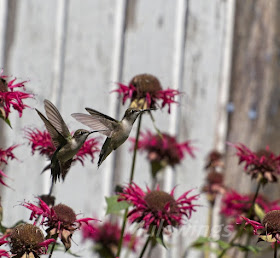This time with the camera. Well, I have used the Sequence shooting before, but never thought to do this.
And I really wonder why. It is such a delightful way to present a photo. It involves a bit of knowledge of layers and editing, with modern programs it is much easier to do than ages ago.
I did this handheld because I happened to be walking outside with camera in hand while peering at the flowers. I wanted to see if any other butterflies showed up other than the Swallow Tail.
The result was the same butterfly in flight in two stages.
That was fun to try so I tried it a few more times. Several times I noticed a lot of activity around the Zinnias so I grabbed the camera and kept trying to catch something amazing.
Below is an example of how the shots look as I start to put them together. These were shot at 1/2000 of a second in rapid fire. The butterfly moved quickly but overlapped itself in subsequent shots.
I thought it would be a good learning experience to try and merge 4 shots of the same butterfly.
It was work but in doing so, I understand a bit better as to how the Swallow Tails move.
A Monarch showed up later in the day by the Zinnias and I had to wait for it to settle down. I took a series of it and was disappointed in that it just fluttered and hovered over the same flower while a Swallow Tail did a Photobomb!
I think I learn so much from observing and photographing them.
I do the same thing with insects, flowers, trees, and fungi. If it makes me curious, I have to study it through the camera.
That said, birds are beginning to migrate. The Orioles have been gone for a few weeks, the sound of Robins has diminished, the Bluebirds headed out in mid July, the red wing blackbirds are few and far between...and the Wrens are still here, but quieter.
I will miss the Wrens more than any other bird.
Soon enough the trees will start to show that they are tired and ready for their rest.







These photos are all just magical! What great skill to capture all these marvelous shots and to put them together in such a fantastic way. I especially like the humming bird. Just beautiful.
ReplyDeleteI got the idea from watching a pro do it and explain how it was done. I don't know why I never thought of it myself.
DeleteTheir work was jaw dropping.
You are creative and talented. Way over my head!
ReplyDeleteThanks the idea came from ongoing tutorials by the UK division that promotes this camera.
DeleteI guess I will have to read the book, manual, and see how it is done. They are wonderful creations with the multiple captures in one.
ReplyDeleteIt was done with some editing in software and layers of overlapping the photos. I couldn't do it in camera. But that would be neat.
DeleteSuch a pro!
ReplyDeleteNot really, just trying out ideas that I've seen demonstrated!
DeleteWow they are great photos, you are so talented!! Yes the mornings feel like Fall:)
ReplyDeleteThey are getting cooler! Feels nice!
DeleteOf all of the swallowtails you could have captured, you go the Giant Swallowtail. A "rare" stray from the south. ( Florida, the like oranges...) I find them at least sever times a year in the northern latitudes, but they are still rare compared to Monarchs and Spicebushes.. I have never tried that method with my shots.. probably because I do not have the best camera on the market. Bu it is a cool thing to learn.
ReplyDeleteThat is interesting! I had no idea that it would be a 'rare' stray one. I was just excited to keep seeing it and then try to photo its flight pattern.
Delete